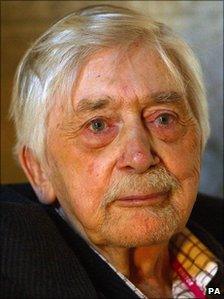Scots Makar Edwin Morgan dies aged 90
- Published

Edwin Morgan was the first Scottish national poet
The Scots Makar - or national poet - Edwin Morgan has died at the age of 90.
Mr Morgan, who was widely recognised as one of the foremost Scottish poets of the 20th Century, passed away on Thursday after suffering pneumonia.
He was born in Glasgow's west end and grew up in nearby Rutherglen before studying at Glasgow University in 1937.
His writing spanned more than 60 years and included celebrated works such as The Second Life (1968) and From Glasgow to Saturn (1973).
Morgan was announced as Glasgow's first Poet Laureate in autumn 1999, and was awarded the Queen's Gold Medal for Poetry in 2000.
In June 2001 he received the prestigious Weidenfeld Prize for Translation.
Morgan was named as the first Scottish national poet - the Scots Makar - in 2004.
By then he had cancer, and had moved into a nursing home, but he continued to write, most memorably a poem about his battle with the disease.
Paying tribute, First Minister Alex Salmond described Morgan as "a truly a great man, an exceptional poet, and an inspiration".
He said: "Much-loved in Scotland and indeed around the world, his work tackled all manner of global issues and major historical events closer to home.
"His passion for observing all aspects of Scottish life shone a spotlight on Scotland for the rest of the world.
"I vividly recall the poem he wrote for the opening of the Scottish Parliament, when he wrote 'Don't let your work and hope be other than great'. That epithet must surely apply to Edwin Morgan himself."
In a statement on the Scottish Poetry Library website, Carol Ann Duffy, the Poet Laureate, said: "A great, generous, gentle genius has gone. He was poetry's true son and blessed by her. He is quite simply irreplaceable."
Morgan's work was wide-ranging in terms of style, form and subject.
He attempted most forms, from sonnets to opera libretto to concrete poetry, with a humour and passion which made him popular with a wide audience.
His work frequently crossed over into other artforms - jazz, opera and theatre among them.
He also translated and drew inspiration from a wide variety of languages, genres and historical periods.
Realism and fantasy
Morgan published his first book in 1952, The Vision of Cathkin Braes.
In the early 1960s he began publishing experimental poetry which led to his breakthrough book, The Second Life.
It contained everything from cut-up newspaper headlines to love poems and Glasgow poems.
His next major collection was From Glasgow to Saturn, a reference to his interest in space exploration.
Both these books have been taught in schools across Scotland.
When first published in 1984, The Sonnets from Scotland was illustrated by author Alasdair Gray, whose book Lanark (1981) inspired many writers to explore ways of combining realism and fantasy.
In Morgan's sonnets, St Columba and St Mungo rub shoulders with Glasgow folksinger Matt McGinn.
Archive opened
In 1997 Morgan published Virtual and Other Realities, which brought together two commissioned works.
The Five Pointed Star was written for the Burns Bicentenary in 1996, while Beasts of Scotland was commissioned by the Glasgow International Jazz Festival and then set to music by the saxophonist Tommy Smith.
Morgan wrote Poem for the Opening of the Scottish Parliament - which was read by Liz Lochhead at the opening ceremony in 1999 because he was too ill.
Cathures (2002), which takes its name from the oldest known name for Glasgow, saw Morgan's imagination return to his native city.
In 2007 the Edwin Morgan Archive was opened at the Scottish Poetry Library.
Although Morgan's output slowed, he continued writing until his death. Dreams and Other Nightmares: New and Uncollected Poems 1954-2009 was published earlier this year to celebrate his 90th birthday.
- Published19 August 2010